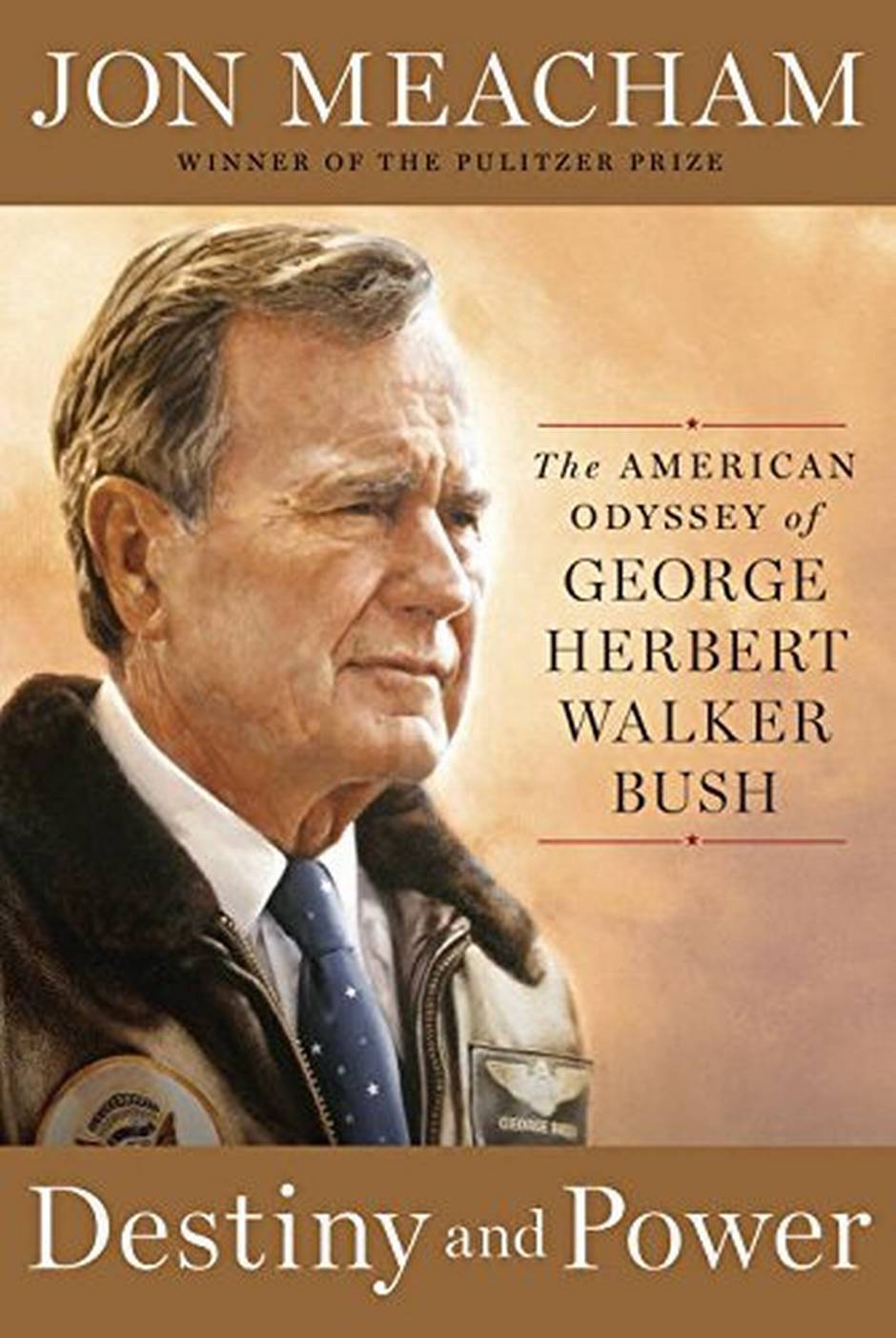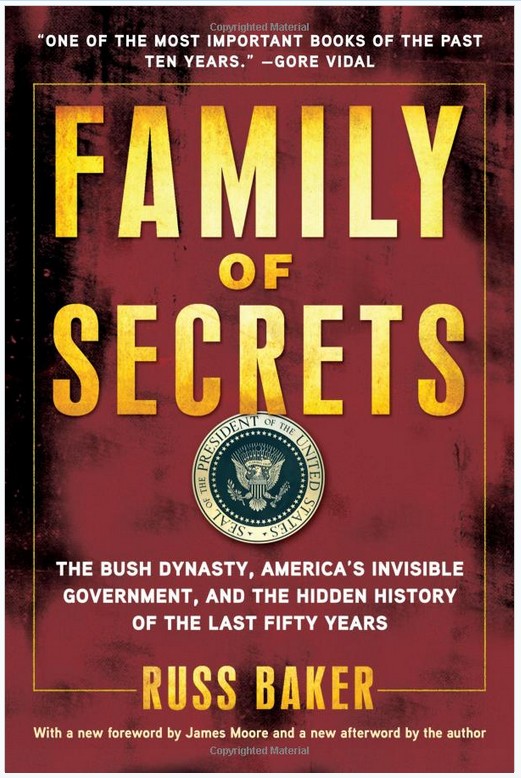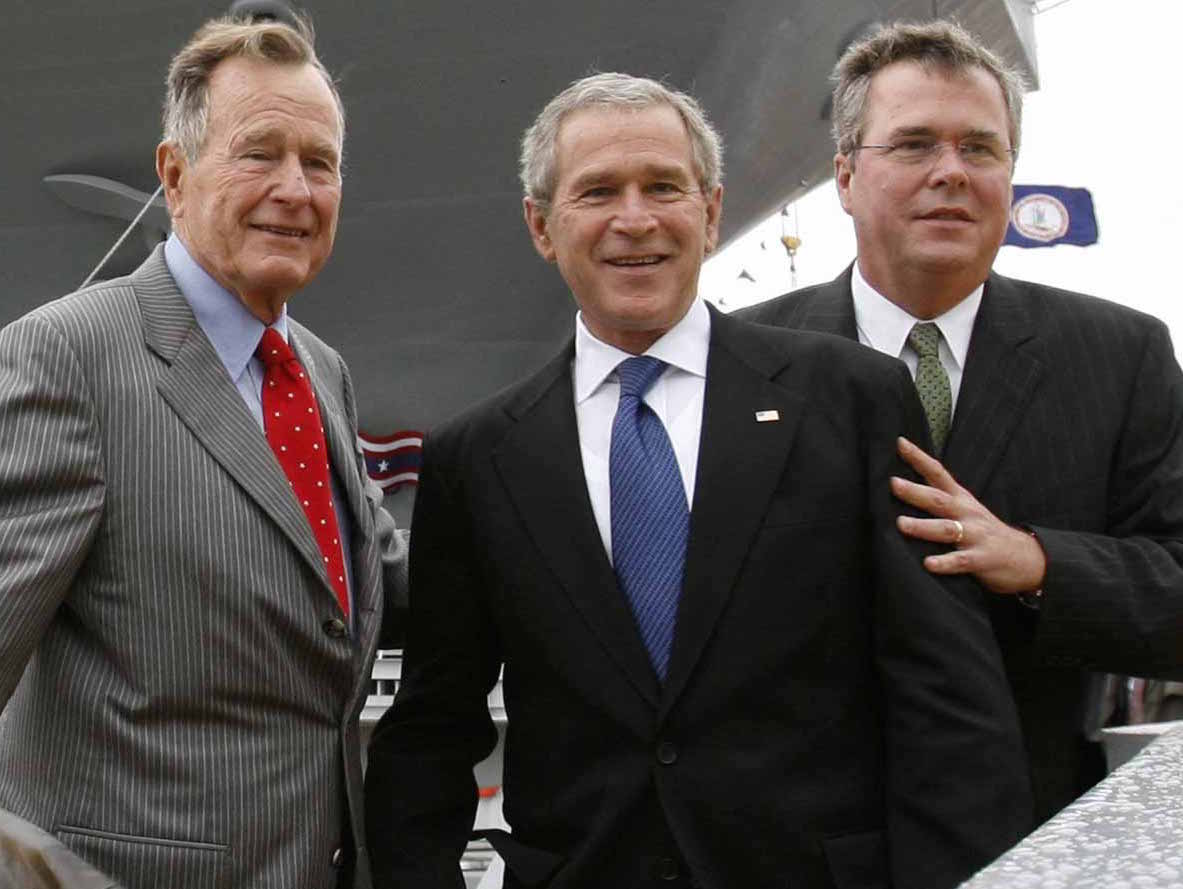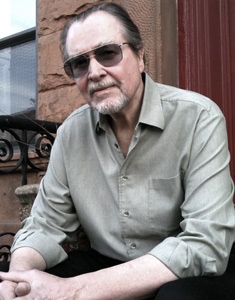A VOICE of BALTIMORE BOOK REVIEW
Journalist/author Barney Rostaing compares two “Bush 41” biographies
— one old, one new — exclusively for VoB

The 41st U.S. President, George Herbert Walker Bush, is the subject of a new best-selling, highly favorable biography by Pulitzer Prize-winning (2009) journalist/political historian Jon Meacham.
CONTRARY TO CLOSE COMPETITOR
DEFENSE SECRETARY RUMSFELD,
BUSH IS LIKED AND ADMIRED
BY NEARLY ALL AMERICANS
A rare and decent man in politics,
with character his strong point…
but questionable family ties
IN SERVICE OF THE ESTABLISHMENT,
BUT BETTER THAN HIS OLDEST SON
By Bjarne Rostaing
George H.W. Bush would have handled the 21st Century much better than his cheerleader son or speechifying successor.
That’s clear from Jon Meacham’s best-seller — Destiny and Power: The American Odyssey of George Herbert Walker Bush — but the fawning introduction will irritate anyone who knows what a tough, ruthless man George H.W. Bush could be.
Winning was trained into him – winning within the rules as his family understood them.
Along with strong, patient ambition, he had an appreciation of money that comes with membership in an aggressive, successful banking family: He could foreclose a metaphorical mortgage without spoiling dinner with his family.
His denunciations of Dick Cheney and Donald Rumsfeld are the red meat, but the book reads like an authorized biography, which is to say, sanitized.
But as I kept reading, I was surprised. Aside from his determination to see no evil, Meacham has much to say about G.H.W. Bush.
The man comes alive, along with his looming Nazi-sympathizer father, Connecticut U.S. Senator Prescott Bush, and his ferocious mother, who brought the wild and crazy creative Walker blood.
But Bush 41 was a rules-based man, devoutly conventional, with serious balls and solid intelligence.
He enlisted after Pearl Harbor as a teenager and flew endless missions in a torpedo bomber, the most vulnerable crate you could fly in WW2.
No great aeronautical talent, he wasn’t chosen to fly fighters, but he did the job assigned, which was his way.
His long-range thinking was unimpressive though, and his backing of Barry Goldwater in 1964 says a lot about this shortfall in what he called “the vision thing.”
His lack of instinct about the future was consistent and surprising, as if any kind of speculative thought outside narrow parameters was verboten.
His consistent human warmth surprised me. Actually shocked me.
UPBRINGING LARGELY BY HIS MOTHER
Modesty fit his upbringing, which was largely by his mother, but not his friendly unpretentious manner, which rarely changed.
He was no snob, and was liked wherever he went, unlike his close competitor, Donald Rumsfeld.
And he was known as someone who’d go out of his way to help.
Skull and Bones, yes — it ran in the family — but a schoolboy who would stop bullying when he saw it, and be remembered for it.
Character was his strong point, but he could cry — and did.
A family man who freely discussed his premarital virginity with mom, he was torn apart by his daughter’s childhood death but found the strength to support his grieving wife.
Decent is the word, and it’s rare in politics.
But the Bushes were never in the Roosevelt league — they were bankers and businessmen.
Nor were they in the running with the Kennedys, who had brilliance and vision to go with their determination, and had to be killed to stop them.
Bush would never have seen through Vietnam and tried to back out of it, as Kennedy was doing by 1963, or found a path through the Cuban Missile Crisis, or kept a live back-channel open to Castro.
SHREWD COMMON SENSE AFTER DESERT STORM
But he had the shrewd common sense after Desert Storm to leave his ex-pal Saddam Hussein in power, which his cocky draft-dodging son did not.
And if he wouldn’t use a word like “realpolitik” or say it correctly, he understood it, and the limits of power as well, which that son never did.
Was his alliance with dirtbag hatchet-man Lee Atwater and their Willie Horton ad filthy? It was.
Was he in the thick of Iran-Contra? Meacham fudges this, but he was.
There is a dark side, a very dark side suggested by his close association with the dirtiest bank that ever was (BCCI), and in his endless relationship with the CIA, which Meacham dodges.
With a solid record at top schools, he was a cautious, conventional thinker who could justify almost anything in service of the establishment.
No one ever thought of him as a man who would make a bold original stand or come up with the unexpected.
Unlike JFK, who was drafted to greatness by his father, Bush was a man of unashamed ambition, a practical businessman who saw Atwater and Iran-Contra as somehow within the rules.
Then he pardoned most of those indicted in Iran-Contra — that was within his rules as well.
Meacham’s take on his appointment as CIA head being a total surprise is stupefying.

Family of Secrets is a 2008 unauthorized biography by investiga- tive journalist Russ Baker that is highly critical of the Bush Family.
With some limited knowledge of the espionage world, I was aware that he had been closely associated with the agency as early as the 1950s, and that his father was close to then-CIA head Allen Dulles.
At that point I found an antidote, Family of Secrets, by Russ Baker.
Published in 2008, it covers the Bush clan generally, and is extremely well-researched, carefully documenting G.W.H. Bush’s activities and associates, and the long agency experience that made him the perfect man to resurrect a CIA under heavy fire.
Baker is a very different sort of writer, a hard-driving unpretentious journalist/zealot; whereas Meacham is smooth and ultra-professional, without edges, like fine old brandy.
Baker lacks that finesse, or the ability and inclination to write his way smoothly around awkward realities.
Thus a very credible everyday spook-thinking Bush emerges, able to create ambiguity and confusion about almost anything he wishes to obscure.
Most importantly, Baker establishes and thoroughly documents the linkage between CIA, Wall Street, Big Oil, and what were then conservatives: Men for many of whom the oil depletion tax allowance was sacred.
Baker lays out the real power structure and working relationships of business and government as is rarely done.
He is also a conspiracy theorist, and looks into the Kennedys, who shared Bush’s commitment to government service, but were much closer to the American people and did not think about money as the central issue: The dangerous, popular Kennedys, who could not be bought, and for whom the oil depletion allowance was robbery of American taxpayers.
Aiding and abetting each other, the Kennedys seem doomed, unwilling to come to terms with the most powerful and dangerous people in the country.
Baker weaves his conspiracy well, wringing the juice out of Bush’s very peculiar tale of his whereabouts on that terrible November 22nd.
He makes the really deadly observation that George H.W. Bush seemed to be the only American adult alive who could not remember where he was when he heard of Kennedy’s shooting, a moment burned into our memory as a nation.
For me it was a clear crisp day in Connecticut, and I was on my way to buy my first car, a second- hand Studebaker.
I was listening to my first Beatles tune when the announcer broke in to say the President had been shot.

Bush Family dynasty? From left, Bush 41, Bush 43, and prospective Bush 45: Also/Known/As George H.W., “Dubya” and John Ellis (Jeb).
Almost every American alive at that time has a similar memory, even schoolkids, but George H.W. Bush is hazy about that day, and offers a kind of factoid miasma with just one hard and very curious fact: a bizarre phone call to the FBI accusing a local Republican officeworker of speaking favorably about such a deed before the fact.
This very peculiar call established Bush’s presence away from Dallas at almost the crucial time. But he gave himself away by having someone visit the hapless victim of his accusation, providing an alibi that established his innocence.
Baker on the JFK assassination is like a dog with a wonderful bone, ecstatic at what he’s finding in there.
But when he tears himself away and moves forward, his facts roll like big tanks on the battlefield of big money: Who knew whom, and how they served each others’ purposes, link upon link upon link.
It is the kind of history that can never be taught in school, because it is too real and too revealing.
I knew much of it in outline, but seeing it detailed so fully was impressive. Just how many favors of all kinds are routinely exchanged between CIA and corporations is thought-provoking.
In the middle of it all, knowing everyone, is the very dark and capable G.H.W. Bush, later to mastermind Iran-Contra, a grotesque, massively corrupt, and totally illegal international operation involving many eminent people, cabinet members among them, working with thugs to overthrow an elected government.
It was largely funded by cocaine and required endless inexcusable pardons by Reagan and Bush, who had no choice.
Along with my memory of the JFK assassination is another: two tough Texans having it out on TV — Bush and the much-maligned Dan Rather, who had found out where the Iran-Contra bodies were buried.
Bush’s half-concealed fury at being braced on sacred matters by a mere reporter is remarkably ugly, and when Rather mentions Amiram Nir, the Israeli liaison for Iran-Contra, that most significant name is blown away by a snarling Bush who won’t let Rather talk.
‘MEMOIRS’ WOULD HAVE ENDED BUSH’S CHANCE FOR THE PRESIDENCY
The cocky gunrunning young Nir had spoken to Bob Woodward of the Washington Post about publishing “his memoirs,” which would have ended Bush’s chance for the presidency.
He died under mysterious circumstances, apparently in Mexico, just weeks following the 1988 elections, and the rest is history.
Two very different and interesting books.
Meacham’s is masterful in its adulation and style, a preordained best-seller.
Baker’s is like a hit of white lightning, with rough journalistic edges; but it’s definitive in presenting a great mass of hidden evidence about G.H.W. Bush, his clan, and the workings of money and power in this country.
Unlike Meacham he doesn’t have that professional sense of where to draw the line, or when to present thoughts as speculation, and piles on endless circumstantial evidence.
Too much; it is obsessive.
Family of Secrets feels radioactive, and actually seems to have frightened some reviewers, as if they could feel the CIA looking over their shoulders.
SHOULD HAVE TAKEN A DAY OFF
Baker plays right at the edge.
When he named Woodward as an intelligence agent conspiring with John Dean to remove President Richard Nixon from office for opposing the oil depletion allowance, I wished he’d taken a day off.
Woodward always knows too much; I assume he gets along well with the CIA and might return a favor.
Like tipping them off that Amiram Nir was planning an Iran-Contra exposé. But that’s not the same as being an agent and conspiring to impeach a president.
What I do clearly remember is the young, earnest, fearful Watergate lynchpin John Dean walking a razor’s edge, his career going up in smoke.
The thought of him conspiring with Woodward to save the oil depletion allowance just didn’t pass the smell test.
The edge of hysteria in Baker’s thinking is a nice balance to Meacham’s flawless whitewash, though, and there is much more to be learned from his book than Meacham’s.
bfrostaing@voiceofbaltimore.org

Barney Rostaing is a “Red Diaper Baby” and journalist/author who had a role in Uma Thur- man’s debut film, “Kiss Daddy Goodnight.”
Bjarne (Barney) Rostaing was an editor at the SoHo Weekly News, won a First Place AFI Award for a sports video, and worked with Uma Thurman in her film debut in “Kiss Daddy Goodnight” (1987). As a sports writer, he exposed — in Sports Illustrated — the 1984 U.S. Olympic blood doping scandal.
His latest novel is Epstein’s Pancake — click here — a political/historical thriller set at the end of the Reagan Administration, with Iran-Contra still smoldering and George Bush looming as the winner of the 1988 presidential election against a hapless Michael Dukakis.
Just out, it’s published by St. Mark’s Press and is available for purchase on Amazon.com and at Barnes & Noble — click here and here.
Rostaing’s earlier works include Breeders (St. Mark’s Press/2011), a crime novel set in the world of horse racing; Phantom of the Paradise (Dell), based on the 1974 horror film starring Brian De Palma; and Bill Walton’s Total Book of Bicycling (Bantam Books/1985).
Originally from Bantam, Conn., the “Red Diaper Baby” lives and works in Brooklyn, N.Y.
This is his initial contribution to Voice of Baltimore.
EDITOR’S NOTE:
Jon Meacham, 46, is executive editor and executive vice president of Random House publishers. A former editor-in-chief of Newsweek, contributing editor to Time magazine, editor-at-large of WNET-TV, and a commentator on politics, history and religious faith, he authored Thomas Jefferson: The Art of Power, published in 2012, and won the 2009 Pulitzer Prize for Biography for his highly acclaimed American Lion: Andrew Jackson in the White House.
Destiny and Power: The American Odyssey of George Herbert Walker Bush (Random House / 2015) is available in hardcover, paperback, Kindle edition and Audio CD, all on Amazon.com.
The Oil Depletion Allowance in American tax law was claimable by anyone with an economic interest in a mineral deposit or standing timber. Similar to the concept of depreciation, it allowed an owner or operator to account for the reduction of a product’s reserves and was a cost-recovery system for accounting and tax purposes. In times past, the federal government allowed owners of oil wells to take a tax deduction for selling their own oil, effectively re-compensating them for using up their own reserves.
The Iran-Contra affair was a political scandal that occurred during the second term of the Reagan Administration, when George H.W. Bush was Vice President. Senior administration officials secretly facilitated the sale of arms to Iran, which was under an arms embargo, in the hope of securing the release of several American hostages, and to fund the Contras — various U.S.-backed and funded terrorist rebel groups in Nicaragua — in violation of a prohibition against such funding by the U.S. Congress.






December 2nd, 2015 - 8:38 AM
This is a very useful piece that leaves the reader wanting to read both of these books. This is a two in one review that also compares and contrasts Russ Baker’s “Family Secrets.” Every story has a villain, a hero, and victims. The villain is the continuing search for the extent to which this country is run by a network of people interested in protecting their families’ hold on money and power. It is a story, in every generation, that too few know. Constantly surprising is that many of those most negatively affected by the resulting laws, rules, policies and practices think, vote, volunteer, and contribute to those who work against their best interests.
December 3rd, 2015 - 5:10 PM
If I wanted to read either biography, it would be th no-nonsense Russ Baker book. As I don’t generally read them, especially when the subject is someone I don’t admire (read, “politicians”), I will opt instead for Rustaing’s novel, Epstein’s Pancake. Very well written, informative review – 2 for the price of one. I learned more about the Bush dynasty than I ever wanted to know!
December 8th, 2015 - 7:24 PM
Thanks, Margo. It’s what any writer wants to hear. Hope you like it.